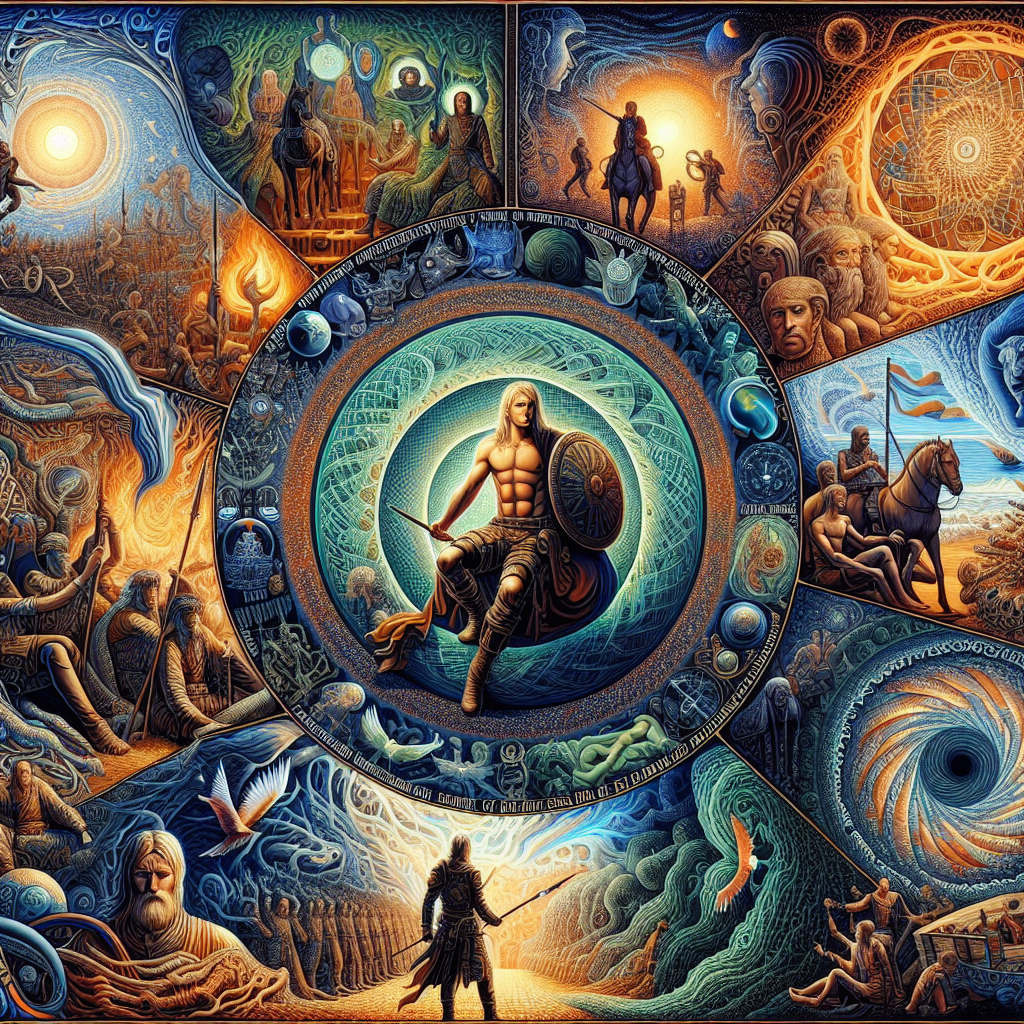In the tapestry of human culture, few concepts captivate the imagination as powerfully as reincarnation. From ancient myths to contemporary narratives, the idea of returning to life in a new form has inspired stories across generations. Today, we explore the intriguing figure of the “Suicidal Battle God 100” and how this character embodies themes of redemption and rebirth. Join us as we unravel the layers of storytelling and philosophical insights surrounding this enigmatic figure, and discover how the trope of reincarnation remains a timeless source of inspiration and introspection.
Understanding Reincarnation Across Cultures
Reincarnation is a concept deeply rooted in various cultural and religious traditions. From the ancient Egyptians to the Hindus, many have believed in the possibility of life after death, where the soul returns to Earth in a new body. This belief serves as a foundation for numerous myths and legends, depicting heroes and gods who rise again to fulfill their destinies. In modern fiction, reincarnation is often used as a vehicle to explore themes of renewal and eternal life, resonating with audiences who yearn for second chances and new beginnings.
In Hinduism, reincarnation is intrinsic to the cycle of samsara, where souls are reborn until they attain moksha, or liberation. Similarly, in Buddhism, the concept of rebirth forms a central tenet, with the ultimate goal being nirvana. Meanwhile, in Western cultures, reincarnation is less commonly embraced but still appears in folklore and literature as a means of addressing life’s mysteries and unanswered questions. Through these stories, audiences are invited to ponder the nature of existence and the possibility of life beyond death.
The enduring appeal of reincarnation lies in its ability to transcend cultural boundaries and speak to universal human experiences. It offers a framework for understanding personal growth and transformation, allowing individuals to imagine lives beyond their current circumstances. By examining the character “Suicidal Battle God 100,” we gain insight into how reincarnation narratives continue to captivate and inspire.
Profile of the Suicidal Battle God 100
The “Suicidal Battle God 100” is a character who epitomizes the themes of redemption and rebirth. Often portrayed as a warrior burdened by past mistakes and tragedies, this figure is granted the chance to start anew through reincarnation. This opportunity for redemption allows the character to confront their inner demons and grow into a hero who transcends their former self.
In various stories, the Suicidal Battle God 100 is depicted with a complex personality, torn between a fierce desire for battle and an underlying yearning for peace. This duality captures the audience’s imagination, as they witness the character’s struggles and triumphs in their quest for self-discovery. Through the lens of reincarnation, the Suicidal Battle God 100 embodies the hope that even the most tormented souls can find redemption and purpose.
The character’s narrative arc often includes themes of sacrifice and introspection, highlighting the profound impact of past actions on one’s present and future. By exploring these themes, the Suicidal Battle God 100 encourages audiences to reflect on their own lives and consider the potential for transformation and growth. This compelling portrayal of reincarnation serves as a reminder that it is never too late to seek redemption and strive for a better existence.
Storytelling Techniques in Reincarnation Narratives
The storytelling techniques used to portray the reincarnation of the Suicidal Battle God 100 play a crucial role in delivering an impactful narrative. Authors and creators employ a variety of literary devices to convey the character’s transformation and engage readers and viewers on a deeper level. Flashbacks, for example, are often used to reveal the character’s past life, providing context for their motivations and struggles.
Symbolism is another powerful tool in reincarnation narratives. The use of motifs such as the phoenix, a bird that rises from its ashes, reinforces themes of renewal and resurrection. These symbols resonate with audiences, evoking emotions and facilitating a connection to the character’s journey. Additionally, the cyclical nature of the story structure mirrors the process of reincarnation, emphasizing the idea of eternal return and new beginnings.
Dialogue and inner monologues provide insight into the psychological and emotional aspects of the character’s transformation. Through their thoughts and conversations, the Suicidal Battle God 100 grapples with questions of identity, purpose, and self-worth. These introspective moments allow audiences to empathize with the character’s struggles and root for their eventual redemption. By employing these storytelling techniques, creators craft a rich and immersive narrative that leaves a lasting impression.
Psychological and Philosophical Dimensions of Reincarnation
Reincarnation narratives, such as that of the Suicidal Battle God 100, offer fertile ground for exploring psychological and philosophical themes. At its core, reincarnation speaks to the human desire for self-discovery and the quest for meaning in life. Through the process of being reborn, characters like the Suicidal Battle God 100 confront their past actions and learn valuable lessons that shape their future selves.
This theme of self-reflection resonates with audiences, prompting them to consider their own journeys of growth and transformation. The idea of reincarnation as a metaphor for personal evolution invites individuals to reflect on their choices and the impact they have on their lives and the world around them. It underscores the notion that change is possible, and that every experience offers an opportunity for growth and learning.
Philosophically, reincarnation challenges conventional notions of identity and existence. By presenting the idea that the soul can transcend physical form and continue its journey, reincarnation narratives encourage contemplation of the nature of consciousness and the interconnectedness of all life. These explorations invite readers and viewers to question their beliefs and open their minds to new possibilities.
Real-Life Beliefs and Reincarnation
The concept of reincarnation is not limited to fiction; it holds deep significance in various real-life religious and spiritual practices. In many cultures, reincarnation is viewed as a fundamental truth that shapes individuals’ beliefs and actions. By comparing these real-world beliefs with fictional narratives, we gain a deeper understanding of the power and influence of reincarnation on human thought.
In Hindu and Buddhist traditions, reincarnation is intricately tied to the idea of karma, the belief that one’s actions in this life determine their fate in future lives. This worldview encourages ethical behavior and a sense of responsibility for one’s actions. In other cultures, such as those of indigenous peoples, reincarnation is seen as a natural cycle of life and death, emphasizing the interconnectedness of all living beings.
These beliefs provide a framework for understanding the enduring appeal of reincarnation narratives. They offer a sense of hope and possibility, suggesting that life is not limited to a single existence. For many, the idea of reincarnation offers comfort and reassurance, providing a lens through which to view their place in the world and the greater cosmos.
Insights from Experts on Reincarnation Tropes
Experts in literature, mythology, and spirituality offer valuable insights into the enduring appeal of the reincarnation trope, particularly in the context of characters like the Suicidal Battle God 100. These insights shed light on the deeper meanings and universal themes that resonate with audiences across cultures and generations.
Literary scholars highlight the timeless allure of redemption and transformation narratives, emphasizing the cathartic experience of witnessing a character’s rebirth. They note that such stories offer a sense of closure and resolution, providing audiences with a satisfying and meaningful narrative arc. The Suicidal Battle God 100, with its themes of redemption and rebirth, exemplifies this powerful storytelling tradition.
Mythologists draw parallels between reincarnation narratives and ancient myths of resurrection and renewal, such as the Greek myth of Persephone or the Egyptian legend of Osiris. These stories, like the tale of the Suicidal Battle God 100, explore the cyclical nature of life and death and the possibility of transcendence. By connecting these narratives to ancient myths, experts illuminate the universal human fascination with the mysteries of existence.
Spirituality experts offer insights into the psychological and emotional dimensions of reincarnation narratives. They emphasize the therapeutic potential of these stories, noting how they encourage introspection and personal growth. By exploring themes of self-discovery and transformation, the Suicidal Battle God 100 inspires individuals to reflect on their own journeys and seek deeper meaning in their lives.
Writing Tips for Incorporating Reincarnation Themes
For writers and creators seeking to incorporate themes of reincarnation into their storytelling, the narrative of the Suicidal Battle God 100 offers valuable lessons and inspiration. These practical takeaways can help infuse your stories with emotional depth and enhance character development.
First, consider the character’s backstory and motivations. What events led to their reincarnation, and how do these experiences shape their actions and beliefs? By exploring these questions, you can create a rich and nuanced character with a compelling arc of redemption and growth.
Next, use symbolism and imagery to reinforce themes of renewal and transformation. Consider incorporating motifs such as cycles, rebirth, or metamorphosis to emphasize the character’s evolution. These visual elements can enhance the emotional impact of your story and resonate with readers on a deeper level.
Finally, remember that reincarnation narratives offer a unique opportunity to explore existential questions and philosophical themes. Use your story as a platform to engage with ideas about identity, consciousness, and the nature of existence. By weaving these themes into your narrative, you can create a story that captivates and inspires your audience.
Conclusion and Call to Action
The tale of the Suicidal Battle God 100 is a powerful example of the timeless allure of reincarnation narratives. Through themes of redemption, transformation, and self-discovery, these stories offer audiences a glimpse into the mysteries of life and the potential for growth and change. By exploring the psychological and philosophical dimensions of reincarnation, we gain insight into the universal human quest for meaning and understanding.






















